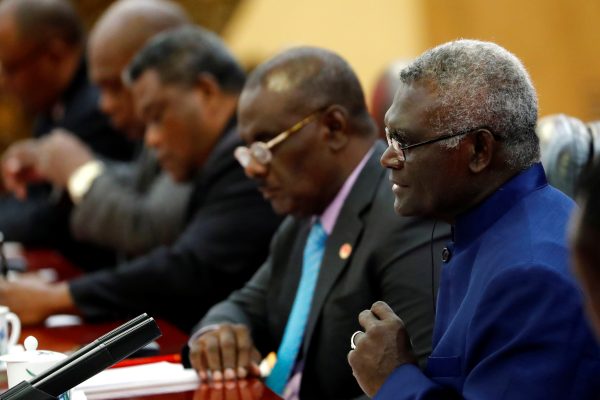The major potential game-changer in 2019 was not the April election or the festering urban unrest, but the long-anticipated switch in diplomatic recognition from Taiwan to China. After much lobbying from Beijing, and from the China Civil Engineering Construction Corporation which promised US$500 million in loans and grants, Sogavare announced the shift in September. Plans were soon afoot to resuscitate the mothballed Guadalcanal gold mine, to build a sports stadium for the 2023 Pacific games and even to temporarily take over Taiwan’s controversial slush funds for MPs.
As elsewhere in the Pacific, some of the deals struck lacked traction. News that the conglomerate China Sam had secured a 75-year lease for the island of Tulagi, including its port facilities, led to furious backtracking after it was pointed out that the deal was unlawful. Such decisions rest with the national government, not the provincial premier. The projected reopening of the Gold Ridge mine may also prove troublesome. That mine passed from company to company during its brief period of operation between 2010 and 2014, and was never greatly profitable.
As is typical of all major policy switches in Solomon Islands, the new Beijing orientation provoked a major split in the government. Some ministers, including 2017–19 prime minister Rick Houenipwela, were sacked for backing retention of 36-year old links with Taiwan. Other MPs from the southern part of Malaita also opposed the new China policy. Schisms were dressed up in the Cold War language of capitalism against communism and democracy versus dictatorship.
Returning from Beijing in October, Sogavare inadvisably declared that ‘there is freedom of worship in the People’s Republic of China’. A rising star on the opposition benches, Peter Kenilorea Junior responded with a rousing defence of Christian principles. The Malaita Provincial Council released a communique that rejected ‘the Chinese Communist Party (CCP) and its formal systems based on atheist ideology’ and declared that no Chinese investments would be welcomed on the island of Malaita.
Honiara’s new diplomatic policy setting also raised ire overseas. US Vice President Mike Pence cancelled plans to meet the Solomon Islands Prime Minister on the fringes of the UN General Assembly. The US Ambassador to Papua New Guinea visited Honiara frantically lobbying to reverse the decision. Despite all the protests about China and Taiwan pushing around small Pacific nations, some US diplomats had no qualms about threatening to punish island states for adopting the very ‘One China’ policy that the United States itself embraced in the 1970s.
The April 2019 elections were relatively trouble-free, despite these being the first elections since the departure of the 2003–17 Australian and New Zealand-led Regional Assistance Mission to the Solomon Islands (RAMSI). As is usual, controversy centred on the subsequent ‘second election’ for the prime ministerial post.
The subsequent fallout indicated yet again what a mess was made of the 2014 Political Parties Integrity Act. This was devised to strengthen parties, but at the 2014 election it had the effect of weakening them. Many former political party members, including Sogavare, calculated that they could best avoid the new constraints of the law by running as independents. No organic cleavages exist around which parties can spontaneously form in Solomon Islands, other than the potentially destabilising differences between provinces. Reformists have therefore called for laws that incentivise politicians to join parties, but usually with unforeseen and damaging consequences.
Sogavare’s main rival for the prime ministerial portfolio, Matthew Wale, petitioned the High Court on the grounds that Sogavare was ineligible to stand as prime minister because the 2014 political parties law required candidates to be members of a political party. The Governor-General instead followed the 1978 constitution, which states that any MP can become prime minister.
The high court backed the Governor-General and rejected the petition. The 2014 Act was intended to encourage greater political stability, but the legal confusion surrounding the validity of the ‘second election’ only served to fuel the grievances of those rioters who took to the streets in eastern Honiara.
Solomon Islands enters 2020 with three years before it next goes to the polls. The economy remains weak and over-reliant on unsustainable round log exports. It is now without the additional spending that accompanied RAMSI’s 14-year presence, but it does have the potential additional low interest commercial and concessional loans offered by China. Some projections have assumed that additional Chinese debt will not increase economic growth, or that this will be wasted on vanity projects or slush funds, but the test of sensible debt-based infrastructure spending (whether Chinese or not) is always whether or not it raises economic growth or contributes to social welfare.
Only one prime minister has survived a full term since independence in Solomon Islands. The year ahead is likely to see further efforts to destabilise the government, organised around whatever potential grand or grubby polarising issues present themselves.
Jon Fraenkel is Professor of comparative politics at Victoria University of Wellington.
This article is part of an EAF special feature series on 2019 in review and the year ahead.

